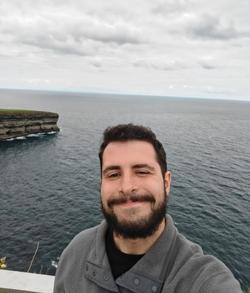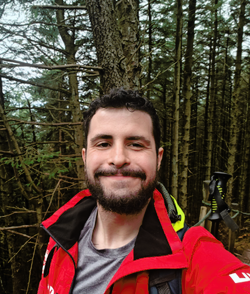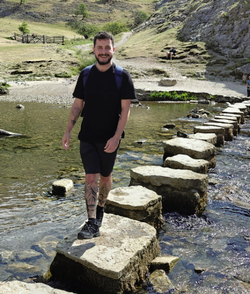LGBTQ+ STEM Day 2025: Liam Cremona

Could you tell me a bit more about yourself?
Hi there, my name is Liam Cremona (He/Him) and I identify as Gay or Queer. I am fascinated by how bacteria respond to stress responses and their environment and I’m currently a PhD student at the University of Warwick, UK, investigating how the model organism Bacillus subtilis sporulates.
Outside of academia I love learning new things and trying new hobbies, from interesting historical knowledge through to skydiving and paddle sports, and jewellery making to painting.
It’s LGBTQ+ STEM Day on 18 November; are you doing anything this year to raise awareness?
I only learned about LGBTQ+ STEM Day recently so nothing else for this year, but I hope to be able to do something to mark it next year.
Could you tell us about your professional experience, as someone who is openly part of the LGBTQ+ community?
I have had quite a varied career so far, starting with working throughout my Bachelors in various roles on-campus and in hospitality more broadly. These had a huge impact on my ability to advance quickly once I graduated, as I already had experience leading and supporting diverse professional teams in addition to my scientific skills.
I think I have been incredibly lucky to have had only a small number of homophobic or discriminatory professional interactions so far and I hope that by supporting efforts to build more inclusive communities (within my workplace and further afield) that I won’t have to experience them in the future.
Do you have any role models or inspirations within STEM; and if so, who?
I am inspired primarily by friends and colleagues who are doing cool things, with the big reason being to learn about something cool, and be open to that having some impact on my own ideas. This is supported by educators like Alie Ward, Hank Green, and Elspeth Kirkman; experimentalists like Evan and Kaitlyn (running a YouTube channel of the same name); and, other academics such as Professor Richard Losick, whom I met through a guest lecture series he taught at Warwick, ‘The River Divides into Thousands of Branches’, which asks the question ‘What was the greatest discovery in biology of the 20th century?’. He explains the science incredibly well and contextualises the research without rewriting scientists’ personal lives - there is an eBook version freely available online currently hosted by Harvard.
Have you experienced any bias or prejudice in academia as a result of your LGBTQ+ identity?
I have perceived very little bias in academia because of my sexuality, and I think a part of that is due to where I have chosen to study and who I try to work with.
It’s taken a lot of work to try to judge who is safe to work with and that is always an uncertainty initially which is why it is so important to create more inclusive environments so that we don’t have to spend as much time having to consider who we can even approach to work with or where is actually safe to exist.

What advice would you give to LGBTQ+ individuals who are considering a career in in STEM?
I would highly recommend considering it as a career! I love learning and the process of discovery and that’s why I chose to pursue biology and academia. It’s so important to work out what you want to do and where you want to do it, then go out and find that place and try that path for yourself (but please remember that that doesn’t have to be academia).
Are there any changes or improvements that are needed in the STEM fields to better support LGBTQ+ professionals?
I think we need to continue pushing for our second spaces (workplaces and universities) to become more openly inclusive in real terms – by actively prioritising inclusivity when building and developing these communities to ensure that we are allowing people to work in ways that are reducing the underlying stress of working out if a place is safe to create your community in. By creating more inclusive spaces, we can hopefully spend more time thinking and doing science and talking about some of the cool things that exist out there.
What has been the highlight of your career so far; and what do you hope to achieve in your career in the future?
My highlight this year has been presenting at the Microbiology Society’s Annual Conference during the Education and Outreach Symposium. I presented a research project on how we can better teach computer coding to those with primarily wet-lab experiences. This experience helped me realise that I enjoy talking about my research and it has made me want to present more in the future.
In terms of my research, I want to collaborate on interesting projects that drive forwards our understanding of how bacteria survive, and establish my own lab in the future.

You became a member of the Society’s Members Panel this year and a representative on the Impact and Influence Committee. How have you found the experience of joining the Society’s governance and do you think it’s important to have LGBTQ+ representation at this level of the Society?
I joined the Members Panel to work out how I can do research and still have an impact on building more inclusive environments and being involved in so many interesting discussions around what we can do and things that we could try has been so incredibly helpful in working out what I want to do for my career. Having the opportunity to represent the Panel on the Impact and Influence Committee has also had a massive impact because it’s an opportunity to champion equity and inclusion at all levels of the Microbiology Society’s governance. Seeing the work of the Members Panel (including everyone involved in enabling the Panel) made me want to get involved and work out how I could have an impact while still having research as my primary focus.
Being able to contribute to these meetings and know that my voice is heard has been such a wonderful experience and I look forward to seeing what we can accomplish in the next few years.
If you are interested in sharing your story for an awareness day, like Liam has, you can log in and complete our awareness day form.
